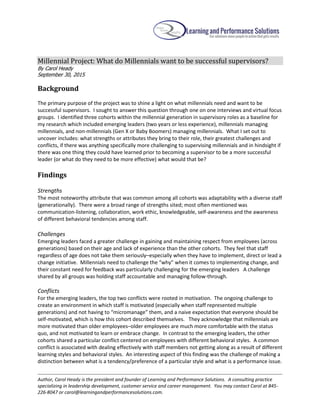
Millennial Project White Paper
- 1. Author, Carol Heady is the president and founder of Learning and Performance Solutions. A consulting practice specializing in leadership development, customer service and career management. You may contact Carol at 845- 226-8047 or carol@learningandperformancesolutions.com. Millennial Project: What do Millennials want to be successful supervisors? By Carol Heady September 30, 2015 Background The primary purpose of the project was to shine a light on what millennials need and want to be successful supervisors. I sought to answer this question through one on one interviews and virtual focus groups. I identified three cohorts within the millennial generation in supervisory roles as a baseline for my research which included emerging leaders (two years or less experience), millennials managing millennials, and non-millennials (Gen X or Baby Boomers) managing millennials. What I set out to uncover includes: what strengths or attributes they bring to their role, their greatest challenges and conflicts, if there was anything specifically more challenging to supervising millennials and in hindsight if there was one thing they could have learned prior to becoming a supervisor to be a more successful leader (or what do they need to be more effective) what would that be? Findings Strengths The most noteworthy attribute that was common among all cohorts was adaptability with a diverse staff (generationally). There were a broad range of strengths sited; most often mentioned was communication-listening, collaboration, work ethic, knowledgeable, self-awareness and the awareness of different behavioral tendencies among staff. Challenges Emerging leaders faced a greater challenge in gaining and maintaining respect from employees (across generations) based on their age and lack of experience than the other cohorts. They feel that staff regardless of age does not take them seriously–especially when they have to implement, direct or lead a change initiative. Millennials need to challenge the “why” when it comes to implementing change, and their constant need for feedback was particularly challenging for the emerging leaders A challenge shared by all groups was holding staff accountable and managing follow-through. Conflicts For the emerging leaders, the top two conflicts were rooted in motivation. The ongoing challenge to create an environment in which staff is motivated (especially when staff represented multiple generations) and not having to “micromanage” them, and a naive expectation that everyone should be self-motivated, which is how this cohort described themselves. They acknowledge that millennials are more motivated than older employees–older employees are much more comfortable with the status quo, and not motivated to learn or embrace change. In contrast to the emerging leaders, the other cohorts shared a particular conflict centered on employees with different behavioral styles. A common conflict is associated with dealing effectively with staff members not getting along as a result of different learning styles and behavioral styles. An interesting aspect of this finding was the challenge of making a distinction between what is a tendency/preference of a particular style and what is a performance issue.
- 2. Author, Carol Heady is the president and founder of Learning and Performance Solutions. A consulting practice specializing in leadership development, customer service and career management. You may contact Carol at 845- 226-8047 or carol@learningandperformancesolutions.com. What They Need or Want Overwhelmingly there are three aspects of supervisory and leadership effectiveness that all cohorts want and need: conflict management, having difficult conversations– especially when delivering constructive feedback, and delegation (leading to greater confidence with “letting go”). In addition, having the opportunity to learn how to deal with difficult situations prior to stepping into a supervisory role was echoed by all groups. Closing Comments I experienced a remarkable amount of openness and honesty with the groups and a genuine (and sincere) interest in sharing their experiences–especially because their participation meant they were contributing to the greater good of the organization. Openness and honesty are attributes I would add to their strengths. One aspect of this research that stands out among the data was the challenges associated with supervising and leading a multi-generational workforce. That challenge isn’t unique to emerging leaders, and is important to address across all levels of management. As I reflect on the question that led me to embark on this project, here are some thoughts to consider: To increase awareness with behavioral tendencies and reduce conflict I’m an advocate for and often use the DiSC™ Everything Workplace assessment series with clients. This instrument can serve as a tool and framework for developing the skills and strategies to help supervisors adapt to generational differences and handle difficult conversations, with an emphasis on using skill practice exercises with actual situations. Delegation doesn’t come naturally to most supervisors, especially emerging leaders, so it’s important to provide a model and training to develop delegation techniques. Using the DiSC™ Everything Management Style instrument is an excellent tool for developing effective delegation techniques. Emerging leaders are very comfortable with collaboration, so foster the sharing of common challenges that all supervisors experience regardless of generation and experience. An effective approach is to create a forum, particularly for emerging leaders and managers to share challenges and collaborate on solutions. The opportunity to conduct this research validated some of the common challenges of supervisors regardless of generation or experience level. It also shined a light on what “we” (non-millennials) may think “we” know what millennials need or want which may or may not be accurate. The emerging leaders group is astutely aware that their generation is “stuck” in perceptions that not all millennials identify with and the sometime negative stigma attached to being a millennial. A member of the emerging leaders group summed it up this way, “Millennials shouldn’t be put in a box, rather seek to broaden their potential and learn how to integrate all generations”.
